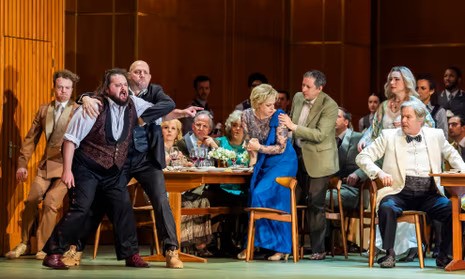The performance at the Royal Ballet and Opera on February 11 had the clear sense of being a significant theatrical event: the world premiere of a new opera by Mark-Anthony Turnage “Festen” is a worthy successor to the important premieres by Thomas Ades and George Benjamin and Turnage himself over the past decades.
The vibrant tension of this new opera is sustained by the contrast between the original dramatic material, music and the method of its staging. The show is based on a critically acclaimed Danish film “Festen” (1998) directed by Thomas Vinterberg and premiered at Cannes. The storyline is simple and brutal: during a jubilee gala hosted by a respected hotel owner, his younger son raises his glass to accuse his father of sexually abusing him and his twin sister, who recently committed suicide.
The plot of the opera follows the film almost directly. But if the film struck us precisely because the characters were so painfully close to us, and the camera made us involuntary witnesses to the agonising family drama, in Turnage's opera, especially as directed by Richard Jones, it has been immaculately stylised, aesthetically matured and presented with both elegance and emotional power. The close-up reality of the film is here distilled into cultural mythology.
The libretto written by Lee Hall has its own clean and clear dramatic structure organising a highly provocative contemporary topic (“with incidents arousing pity and fear”) which adheres to Aristotle's principles.
The music of exceptional power and beauty inevitably makes the action even more emotional, more grotesque. It ranges from motoric neoclassical to deeply lyrical long melodic lines and the striking use of big bang jazz material both as a quotation of a popular genre as well as for its braising emotional force.
The large-scaled and detailed set by Miriam Buether does not recreate a glamourous Danish hotel, but the style of the Danish hotel, referencing Scandinavian design with its clean lines and rational spirit which is even more powerful when contrasted with the dirty truth which gradually emerges.
It is a masterpiece of direction by Richard Jones, whose sense of rhythm and theatricality create an immaculate stage partiture by alternating silence and sound, darkness and light, synchronicity and chaos, and tie up all the stage elements in the beauty of the whole.
The masterly clarity and precision of Ed Gardner's conducting, and a stunning cast give soul to the formal mis-en-scène as well as embodying the philosophy of the evening, perfectly building to the climactic moment of accusation and revelation.
The fact that we, the audience, are also implicated in the crime and its cover-up is shown by the invitations, banners and streamers placed not on stage but in the auditorium. In the last scene when everyone blithely wishes each other “Good morning” as if nothing had happened, we realise that the horrible truth has, once again, gently settled and faded into the plush velvet of the theatre seats.
It runs until February 27th.
Review: Elena Mamchur Photo: Tristram Kenton

